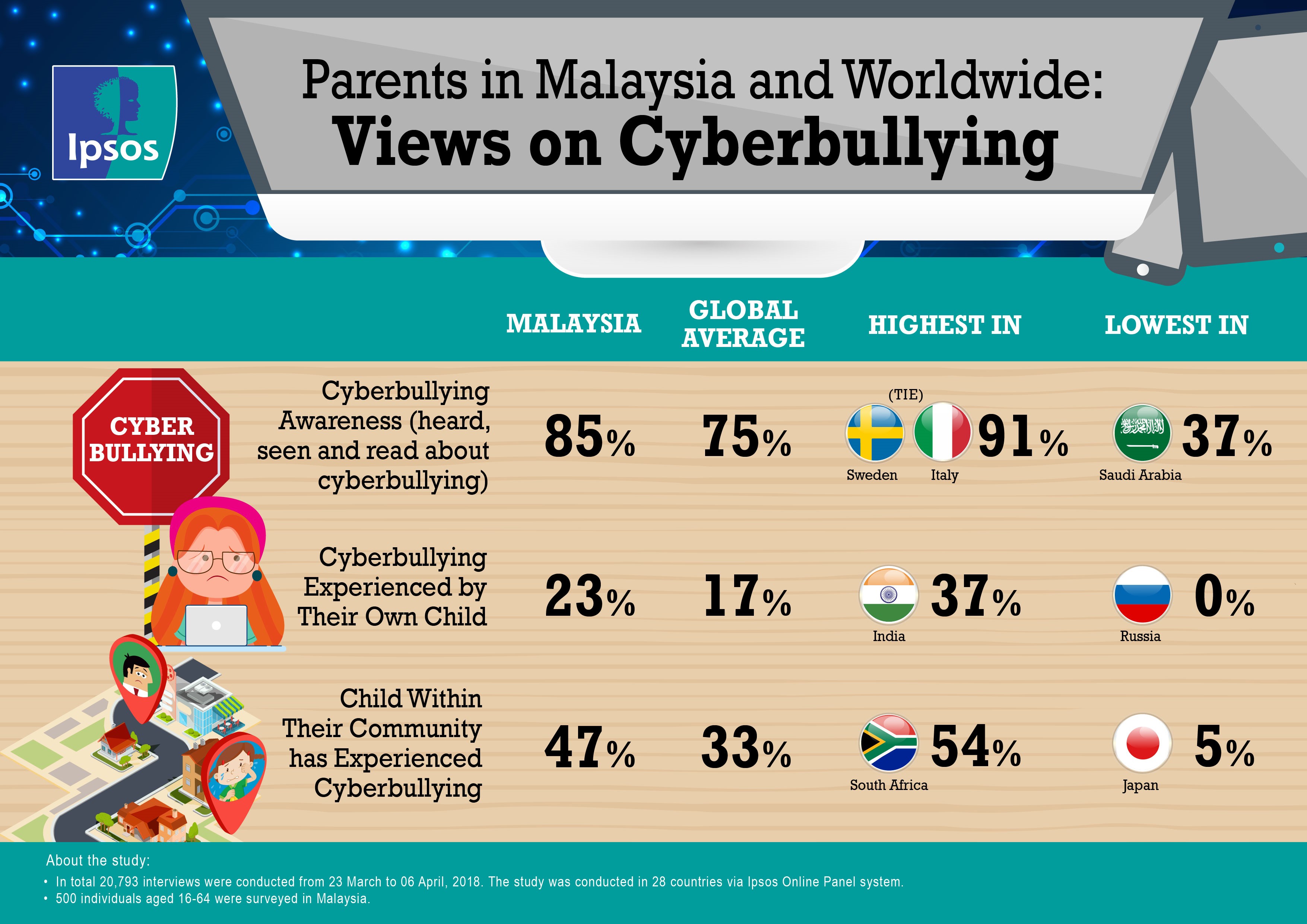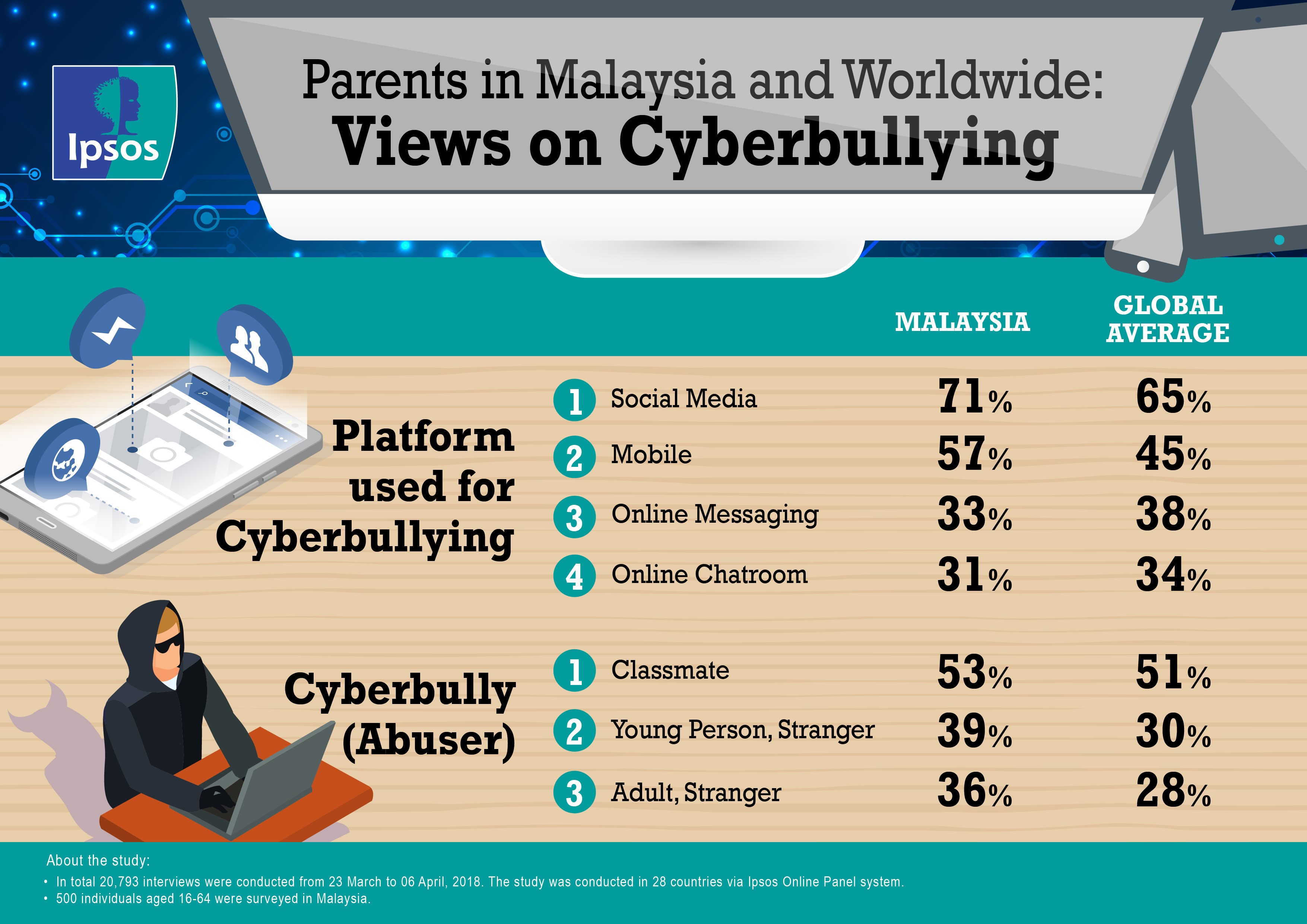Malaysian and Global Views on Cyberbullying
Links to 2021 recent study updates in Malaysia on Cyberbullying:-
--
- Global awareness of cyberbullying is increasing, however 1 in 4 adults globally have still never heard of it.
- Awareness of cyberbullying is high (85%) in Malaysia
- Approximately 1 in 4 Malaysian parents say that their child has experienced cyberbullying
Ipsos' recent Global Advisor study, carried out in 28 countries, finds that awareness of cyberbullying is increasing globally, up 9 percentage points from 2011. Though global awareness of cyberbullying is high (75%), one quarter of adults have still never heard of it. Awareness is highest in Sweden and Italy (91% each) and lowest in Saudi Arabia (37%). Italy has seen the greatest increase in awareness of cyberbullying, from 57% aware in 2011 to 91% now. The United States also has high awareness (85%), thought the level of awareness is relatively unchanged since 2011 (82%). Included in this survey for the time is Malaysia, where awareness of cyberbullying was found to be at a high of 85%.
The study defines cyberbullying as when a child or group of children (under the age of 18) intentionally intimidate, offend, threaten, or embarrass another child or group of children, specifically through the use of information technology, such as a website or chatroom on the Internet, a cellular phone, or another mobile device.
The percentage of parents who report having a child or knowing a child in their community who has experienced cyberbullying has increased globally since 2011. One in three parents worldwide (33%) report knowing a child in their community who had been cyberbullied, up from 26% in 2011. Among the countries surveyed, South Africa shows the highest prevalence their community who has been the victim of cyberbullying, up 24 percentage points from 2011. Parents in Japan (5%) and Russia (8%) are least likely to report knowing a child in their community who had been cyberbullied. In Malaysia, nearly half (47%) of Malaysian parents know a child in their community who has experienced cyberbullying.
Globally, 17% say their child has experienced cyberbullying. This number is on the rise, namely in South Africa (up from 10% in 2011 to 25% now) and Turkey (up from 5% in 2011 to 19% now.) The United States has also seen a significant uptick in parents reporting their child has been cyberbullied, up to 27% this year from 15% in 2011. The prevalence is relatively high in Malaysia as well, where about 1 in 4 parents (23%) say that their own child has experienced cyberbullying.
 71% of Malaysian parents whose child has experienced cyberbullying or know of a child in their community who had been cyberbullied, report the harassing behaviour takes place on social networking sites. This is significantly higher than the APAC average of 53%.
71% of Malaysian parents whose child has experienced cyberbullying or know of a child in their community who had been cyberbullied, report the harassing behaviour takes place on social networking sites. This is significantly higher than the APAC average of 53%.
Across the board, 51% globally reported that the cyberbully is a classmate of the affected child. Malaysia is close to this global average at 53%. In North America, this number is the highest (65%), and in the Middle East/Africa (39%) it is the lowest.
 Globally, a majority of adults (76%) feel that cyberbullying is a fundamentally different type of bullying that needs special attention from parents and schools, in addition to existing efforts to address bullying in general. In Malaysia, a similar proportion of adultst (75%) feel the same way.
Globally, a majority of adults (76%) feel that cyberbullying is a fundamentally different type of bullying that needs special attention from parents and schools, in addition to existing efforts to address bullying in general. In Malaysia, a similar proportion of adultst (75%) feel the same way.
"For Digital Natives, Cyberbullying can be as real bullying in person. Our youth are growing up in a time where there is little distinction between digital and the physical. Their lives heavily intertwined with social media, and where texting is often the primary mode of communication among their peers. It is good that the awareness of cyberbullying is high is Malaysia, but it is important for parents to help their children recognize the abuse when it happens, and from a very young age. Needless to say, schools, pre-schools and the larger community too have a big part to play. It would be great to see more corporates like media and technology companies consuder supporting the cause through their products and marketing campaigns too." Comments Arun Menon, Managing Director, Ipsos in Malaysia.
About the Study:
These are the findings of a Global Advisor Cyberbullying Study. In total 20,793 interviews were conducted between March 23 – April 6, 2018 among adults aged 18-64 in the US and Canada, and adults aged 16-64 in all other countries. Where applicable, trended questions have been shown from Ipsos’ November 2011 and September 2016 cyberbullying studies.
The survey was conducted in 28 countries around the world via the Ipsos Online Panel system. The countries reporting herein are across Argentina, Australia, Belgium, Brazil, Canada, Chile, China, France, Germany, Great Britain, Hungary, India, Italy, Japan, Malaysia, Mexico, Peru, Poland, Romania, Russia, Saudi Arabia, Serbia, South Africa, South Korea, Spain, Sweden, Turkey, and the United States.
Between 500 and 1000+ individuals participated on a country by country basis via the Ipsos Online Panel. The sample was 1000+ in Australia, Brazil, Canada, China, France, Germany, Great Britain, Italy, Japan, Mexico, Spain and the United Stated of America. In all other countries the sample was 500+. The precision of Ipsos online polls is calculated using a credibility interval with a poll of 1,000 accurate to +/- 3.5 percentage points and of 500 accurate to +/- 5.0 percentage points. For more information on Ipsos’ use of credibility intervals, please visit the Ipsos website.
In countries where internet penetration is approximately 60% or higher the data output generally reflects the overall population. Of the 25 countries surveyed online, 17 yield results that are balanced to reflect the general population: Argentina, Australia, Belgium, Canada, France, Germany, Hungary, Italy, Japan, Poland, South Korea, Russia, Saudi Arabia, Spain, Sweden, Great Britain and the United States. The 5 remaining countries surveyed – Brazil (58%), India (19%), Mexico (44%), South Africa (49%) and Turkey (51%) - have lower levels of internet connectivity and reflect online populations that tend to be more urban and have higher education/income than the general population.
Where results do not sum to 100, this may be due to computer rounding, multiple responses or the exclusion of don't knows or not stated responses. Data are weighted to match the profile of the population.



